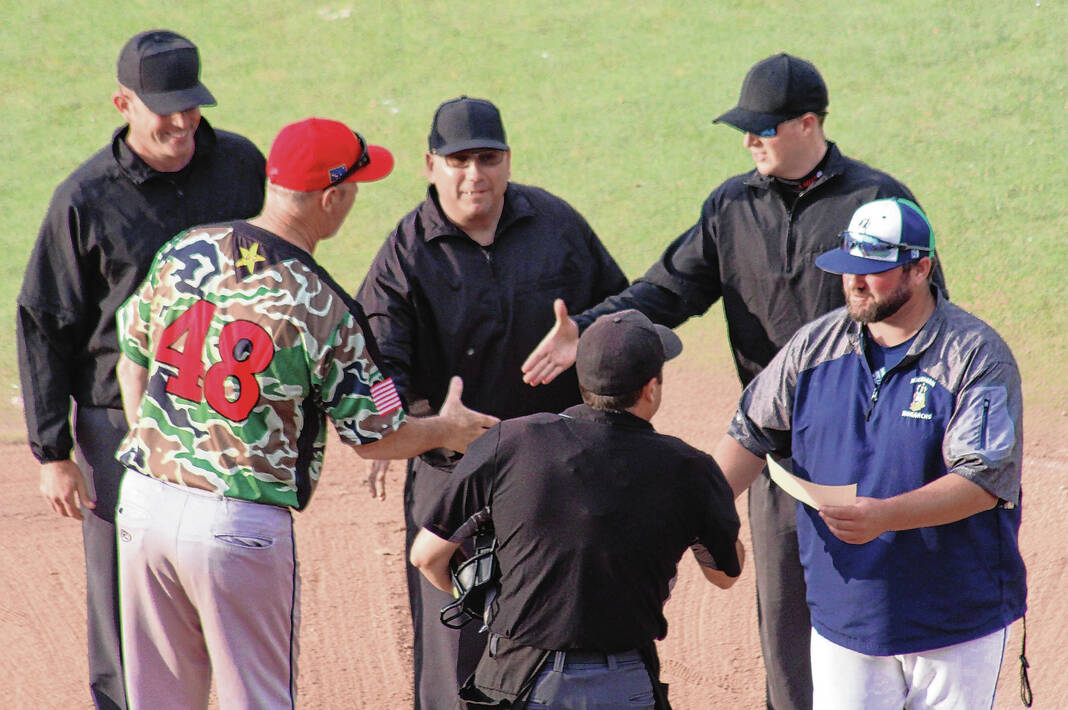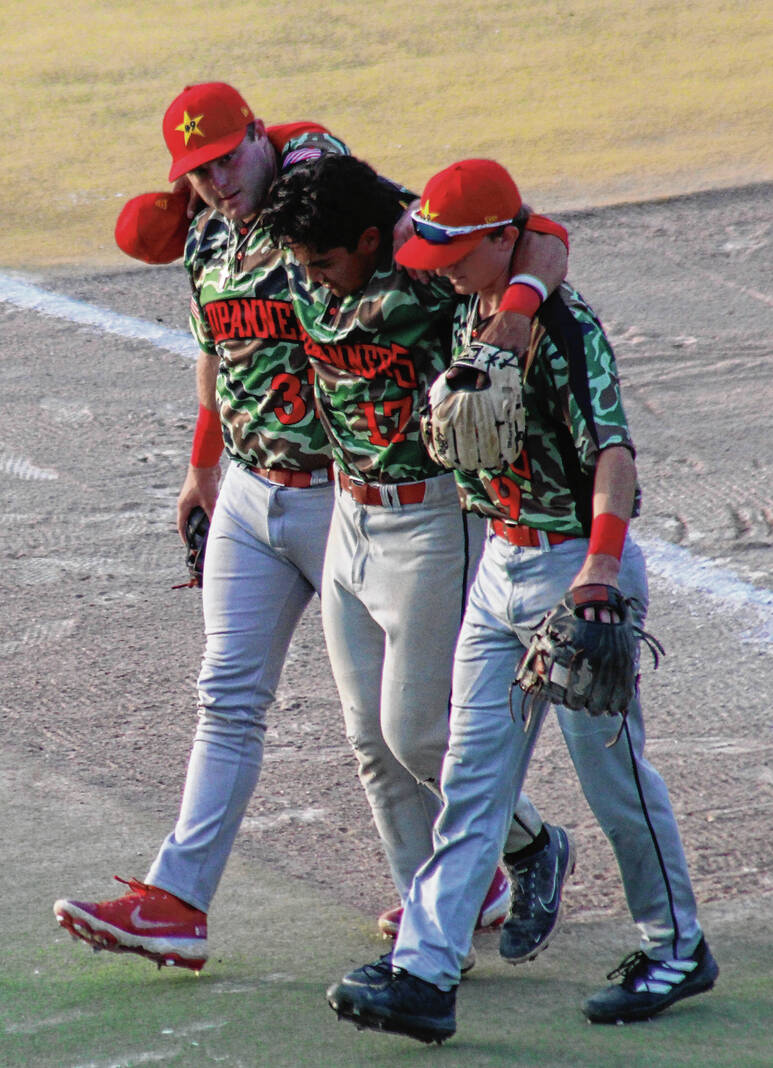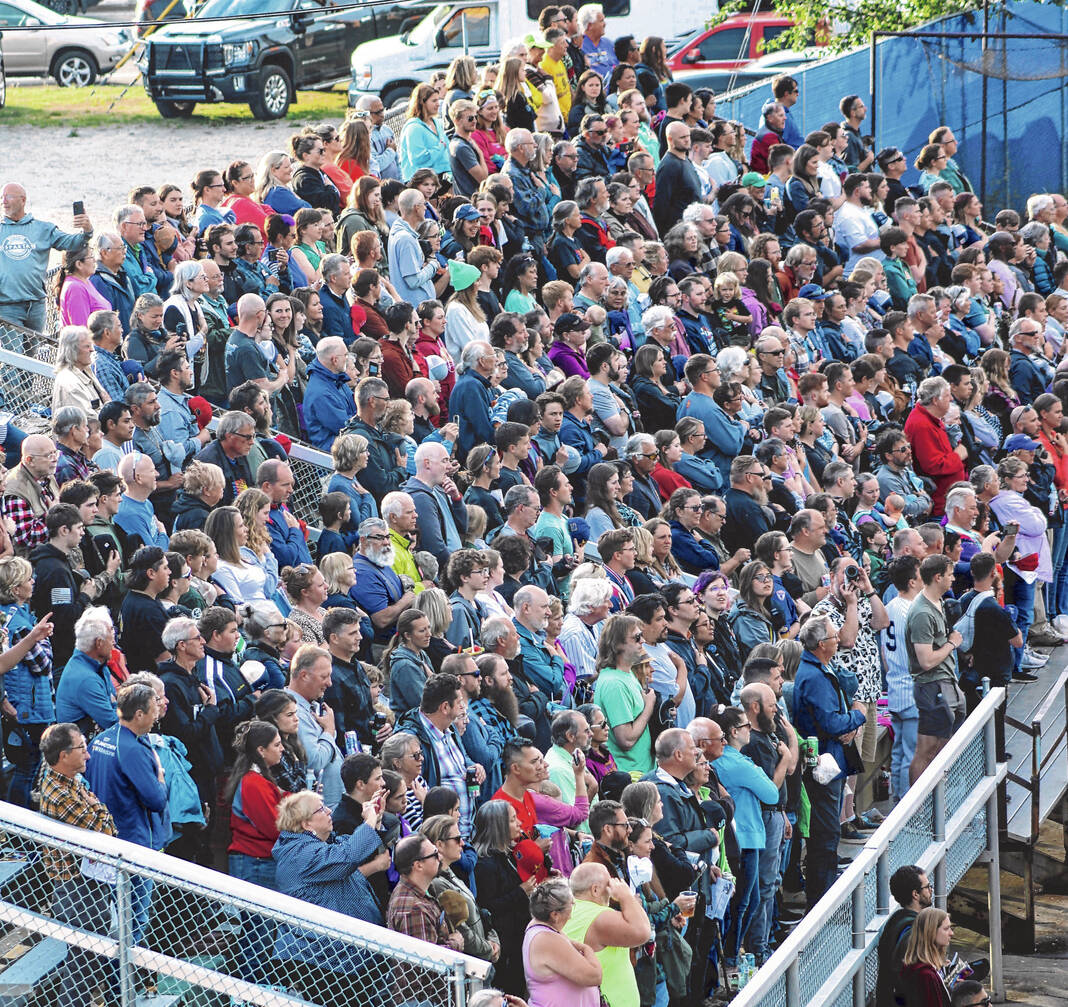FAIRBANKS, Alaska — Alaska Goldpanners outfielder Karl Peters summarized the essence of the Midnight Sun baseball game after he strode to home plate gazing at a rapidly darkening sky.
“I didn’t see anything,” said Peters, who attends College of San Mateo in California when not moonlighting (check that, no moon visible) playing Alaska summer baseball. “I was swinging and hoping it was a fastball.”
As sunset approached at 12:51 a.m. during the 118th Midnight Sun contest, passing from June 21, the summer solstice and the longest day of 2023, into June 22, the strategy became simple. It was much like a youngster closing his eyes for his first at-bat and hoping for the best.
One day a year, they play a night game with no lights on in Fairbanks, first pitch thrown at 10 p.m., a tradition relying on the benevolence of nature and whatever Arctic sunlight of the Far North bestows. Light stanchions ringing Growden Park resemble trees that have shed leaves in autumn, standing tall and proud but idle.
Nowhere else on the planet do they play baseball in such circumstances — and there are only a few places where anyone could, Scandinavian countries, northern Canada, Siberia maybe.
The gift of geography is at the root of the Midnight Sun game. Sunset is at 12:51 and the next sunrise about 3 a.m. Sometimes, if the sky is clear, it doesn’t seem as if the sun sets at all. If it is overcast, viewing, while swinging the bat, fielding a popup or fly ball, becomes increasingly problematical. With common sense brought to his predicament, Peters refused to be flustered.
“They couldn’t see the ball, either,” he said of the opposing Michigan Monarchs.
Indeed, as the evening wore on before a packed house of around 4,000 fans, the visiting squad saw the ball less frequently than the Goldpanners, who won 5-1.
For most on the diamond — and many from elsewhere — the unusual game was likely a once-in-a-lifetime experience.
“It was an amazing time,” said Goldpanner reliever Daniel Sotelo, who realized Michigan couldn’t see his pitches well enough to do him damage in the closing innings. “It was good for me.”
The Midnight Sun game dates to 1906 but has been hosted by the Alaska Goldpanners, a summer team for collegians, since their founding in the early 1960s.
Red Boucher, former Alaska lieutenant governor and local mayor, organized the team for Fairbanks, a community of 31,400 some 358 miles north of Anchorage and 163 miles south of the Arctic Circle. He is honored with a tribute sign on a ballpark wall.
The game is such a big deal for the community, general manager John Lohrke, whose father Jack played Major League ball in the late 1940s and early 1950s, could not relax until the turnstiles stopped clicking.
“It’s a combination of fun and stress,” Lohrke said.
The worst worry was rain, and there was an ominous downpour around 5 p.m., but it was temporary. Lohrke refused to be discouraged.
“I’ve got to be optimistic,” he said.
Lohrke was an accurate weather forecaster, and the late line to obtain tickets stretched deep into the Growden parking lot.
Unique experience
Players have almost never started a game later than 9 p.m., and only then as part of the second game of a doubleheader because of a rain delay.
Lachemann, son of longtime Major League figure Marcel, coaches Hope International University in California but in 2009 was a Goldpanners assistant coach. He was able to tell his guys what to expect.
“It was great fun,” Lachemann said. “I want them to enjoy the event. I want them to embrace being in Alaska. There is a good chance they won’t make it back. Some of them went fishing until 4 a.m.”
Pitcher Cole Philip, from a fourth-generation ranching family near Santa Barbara, California who plays for the University of Colorado-Colorado Springs, knew his rotation turn would keep him benched. So he asked if he could wear his cowboy hat instead of baseball cap. In the spirit of the night, Lachemann said OK.
Although currently playing an independent schedule, historically, the Goldpanners have been an Alaska Baseball League and summer national power, winning National Baseball Congress amateur championships in Wichita, Kansas.
Numerous prominent Major Leaguers passed through Fairbanks. Just a few years ago, Bob Boone, a four-time All-Star, former manager and big-league executive, said his summer spent here was the best of his life.
One-time outfielder Tom Goodwin called the proceedings “a little weird. But we made it through.”
They always do. Former longtime Goldpanners general manager Don Dennis said he became infatuated with the notion of starting the game literally at midnight but recognized 12 to 1 is the darkest time.
“Besides, we don’t call it the mid-morning game,” he said.
Baseball lovers from everywhere
The Midnight Sun game appeals to baseball aficionados. The game appears on lists of baseball experiences every fan should see before dying.
A group called bucketlistbaseball.com., in conjunction with JapanBall, which oversees international tours, helped lure fans to Fairbanks from 38 states. Visitors checked an item off of a personal bucket list.
David Tuason resides in California but is a passionate Boston Red Sox backer. His wife and two elementary school-aged children also are baseball fans. The Tuasons combined a drive to the Arctic Ocean through Canada’s Northwest Territories with this game.
“We travel for baseball,” Tuason said. “But this is part of an epic Arctic adventure.”
Eddie Browning of San Diego, so devoted to Hall of Famer Mickey Mantle he has a small 7 inside a baseball tattooed on a lower leg, said as soon as he learned of the Midnight Sun event, he told himself, “I’ve got to see that game.”
Anna DiTommaso, owner of baseballbucketlist.com, was a fan of Tampa Bay even before the Rays began winning this year. It was OK with her the focus of her debut trip to Alaska, home of majestic scenery and wildlife, was baseball. Her friends, and members, call her “Miss Bucket List.”
She was a power behind this Alaska assault on Fairbanks for bucket-listers.
“I knew we had to make it happen,” DiTommaso said.
Iffy memory
Fairbanks third baseman Rob Mattei was nearly as enthused about playing in the Midnight Sun game as fans were to see it.
“It’s something different,” Mattei said pregame. “The (nighttime) sunlight messes with your brain.”
Mattei’s goal? “I want to put a stamp on it.” Perhaps a diving catch along the foul line to provoke oohs and ahs. In the second inning, he and his shortstop collided going for a ground ball and Mattei limped off the field with his weight on the shoulders of two teammates.
Postgame, he was on crutches, left knee heavily bandaged with a preliminary diagnosis of a torn anterior cruciate ligament. Likely, his summer season was finished, and he worried his senior year at Hope International was kaput.
“If it was the last game I ever play, I can say it was the Midnight Sun game,” Mattei said.
Odd nostalgia, to be sure. Not the bucket list check mark everyone is after.



